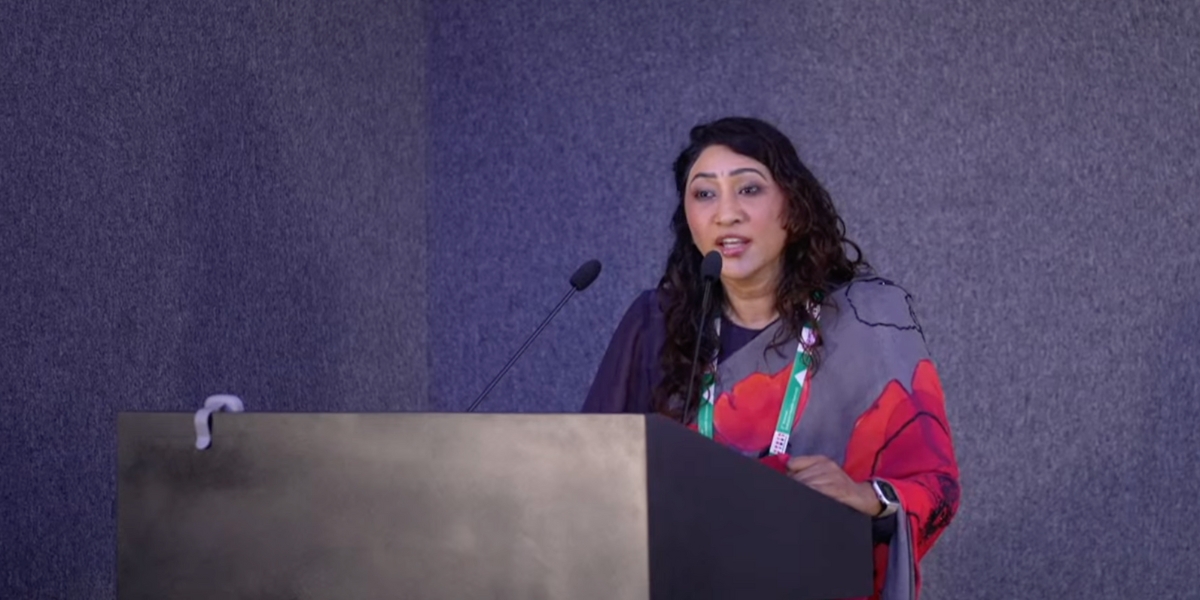Published Nov 09, 2025 | 11:20 AM ⚊ Updated Nov 12, 2025 | 7:01 PM

Dr Rajetha Damisetty speaking at Dakshin Health Summit 2025.
Synopsis: At the second edition of South First’s Dakshin Health Summit, spoke extensilvely about the need to address quackery in dermatology and the need to put a check on quacks.
The second edition of South First’s Dakshin Health Summit is being held at the Asian Institute of Gastroenterology (AIG) at Gachibowli in Hyderabad on Sunday, 9 November. Dr Rajetha Damisetty, Dermatologist and Chairperson of the Anti-Quackery Cell of the Indian Association of Dermatologists, Venereologists and Leprologists (IADVL), spoke extensively about the need to address quackery in dermatology and the need to put a check on quacks.

The second edition of the Dakshin Health Summit 2025 was held at the Asian Institute of Gastroenterology in Hyderabad on Sunday, 9 November.
In her keynote speech, Dr Damisetty, who also runs Mohana Skin, Hair & Aesthetic Clinic in Hyderabad, said India needs to have advocacy, better laws and increase awareness. She also praised the Telangana Dental Council and other state medical councils who are cracking down on quacks.
Meanwhile, inaugurating the Summit, South First Founder and CEO GS Vasu said the Dakshin Health Summit 2025 is an attempt to put science at the centre of healthcare discussions, research at the centre of public wellness.
“What we want to endorse today at Dakshin Health Summit is the importance to fight quackery and bring companies indulging in misleading practices. South First has always stood by and will continue to stand by proven scientific practices. Just like we stood by Dr Rajetha Damisetty when she challenged quacks dispensing medical advice, calling themselves dermatologists. We take pride in the fact that we stood by someone like Dr Sivaranjini in her long and tireless fight against companies that mislabelled products to pass them off as WHO- recommended ORS,” he said.
He also announced a year-long campaign on two epidemics that are emerging in India today — Diabetes and Obesity.
Our campaign will strive to bring you year-long awareness events, discussions forums, deep dive reportage, outreach with stakeholders — all aimed at meaning conversations and initiatives to make India healthier. Let this event be the stepping stone towards this huge journey,” Vasu added.
Dr Damisetty began her speech by highlighting how two young people lost their lives to quackery.
“I’m going to begin with a story — a story of a young engineer in his early 30s who lived in Kanpur. He was happily married and had two children. He was struggling with hair loss. He went to a hair clinic and got a hair transplant. A few days later, he had to be moved to the ICU. In less than three days, he passed away, leaving his family behind. This happened in November 2024.”
“In March 2024, in the same Kanpur, another young engineer went for a consultation and decided to undergo a hair transplant. He too lost his life. He left behind his parents and his spouse.”
“Both had gone to the same person. Their fatal hair transplants were performed by the same individual. Who was she? Was she a dermatologist?”
“We were curious — because there are only around 18,000 dermatologists in India. She wasn’t even an MBBS doctor. She was a BDS graduate — a dental surgeon. She was not a qualified medical practitioner to perform such procedures.”
“It took several months of struggle for the families to get a complaint lodged.”
She further highlighted what quackery is.
“But the question remains: who is a quack? The Supreme Court of India said in Poonam Verma v Aswin Paatel (AIR 1996 SC 2111) that a quack is ‘a person who does not have knowledge of a particular system of medicine but practices in that system is a Quack and a mere pretender to medical knowledge, or to put it differently, a charlatan.’ For instance, I studied allopathy — and if I prescribe Ayurvedic medicine, that would make me a quack.”
“Every one of us here has probably met someone in India who practices a system of medicine they are not qualified in. Let me give you my own example. I studied scientific medicine — also known as allopathy. If I start prescribing Ayurvedic medicines, that would make me a quack.”
“Similarly, if someone trained in dental science begins performing hair transplants, that person, too, would be a quack. And this is not just my opinion — this is what the highest court of the land has said.”
“Even if you have a degree, but are not registered with your local State Medical Council, you still qualify as a quack. One of the most common accusations we face is that doctors like us are only interested in protecting our turf — that this fight is about monopoly or money. But that is not true. This fight is about care, trust, and ethics.”
“Any decent dermatologist will tell you — our concern is not intolerance or competition, but the safety of patients, the protection of the public, and the integrity of our profession, especially for our younger colleagues.”
She said that people losing lives to quackery is a failure of our society.
“When the first young engineer — a government employee in Uttar Pradesh — died after a hair transplant in November 2024, the tragedy didn’t end there. A few months later, another young engineer died under similar circumstances.”
“This is not just a personal tragedy — it’s a failure of our society. We all need to come together to prevent such incidents from ever happening again.”
“Of course, not everyone who goes to an unqualified person will lose their life. But there are many other losses — your money, your time, and most importantly, your faith in modern medicine. When you go to the wrong person and get the wrong result, you might conclude that medicine itself doesn’t work. That loss of trust is devastating.”
“There’s a misconception that dermatology is ‘easy’. People think skin is visible, so anyone can treat it — that it’s just about creams. But that’s completely wrong.”
“We see unqualified practitioners doing procedures like fillers, Botox, and hair transplants — often after attending a weekend course or watching a few online tutorials. These procedures require training, precision, and most of all, medical judgment.”
She said the Summit will discuss the misuse of steroids — another huge problem — and how the pharmaceutical industry and unqualified practitioners contribute to it.
She further distinguished between a cosmetologist and a medical doctor.
“Many people still don’t realise that a “cosmetologist” might not even be a medical doctor,” she said.
“Now, let me make something clear: being a cosmetologist is not shameful. Cosmetology is a vocational field recognised by the Government of India. It includes hair styling, makeup, pedicures — all of which are valuable skills.”
“But cosmetologists are not dermatologists. The qualification for a government cosmetology course is a Class 10 certificate. In contrast, dermatologists are medical specialists who go through years of rigorous training. That’s why we must clearly define the boundaries — for the sake of patient safety.”
“Across the world, standards are clear. Some doctors take a two-hour certificate course and start running full-time clinics. Who supervises the rest of their work? Who ensures the safety of their patients?”
“Clinics have to be licensed by the DM&HO to function legally. For which a registered doctor’s certificate is a prerequisite. But dermatologists who lend their certificates or work for a few hours a week need to remember that they are aiding quackery, as work is continued by unqualified individuals in their absence using their registration.”
“According to the National Medical Commission’s 2022 directive, only dermatologists and plastic surgeons with adequate training and infrastructure are permitted to perform hair transplants.
“In the same year, the Dental Council of India said that only MDS doctors specialising in oral and maxillofacial surgery — and trained for these procedures — could perform them. Others, including BDS graduates or MDS specialists in unrelated fields like orthodontics or oral pathology, are not authorised to do hair transplants.”
“Unfortunately, these rules are being challenged in court. The matter is now pending in the Madras and Bombay High Courts. And there’s more. The person who signed the DCI’s 2022 public notice — which allowed such procedures — was not a doctor or even a dentist! That tells you how deep the structural issues run,” she added.
Dr Damisetty also appreciated the Telangana Dental Council and Telangana Medical Council for their efforts to check quackery.
“Now, I want to acknowledge and appreciate the Telangana Dental Council. In May, they made an important ruling that dental clinics should be recognised only as dental establishments. This was a huge victory, because many patients have said, “If I had known this person wasn’t qualified to perform the procedure, I would never have gone.”
“Even more commendably, the Telangana Medical Council took a brave and unprecedented stand — declaring that MDS (Oral and Maxillofacial Surgery) alone is not a sufficient qualification to perform hair transplants. I am truly proud to belong to this land, where regulators are willing to take a stand for what is right.”
“So, what does India need now? We need advocacy. We need better laws. We need awareness.”
“Justice moves slowly, but social media is powerful. So, I urge all of you — tag us, tag the Telangana Medical Council, share information, and help gather evidence. We must partner with these institutions to identify and act against unqualified practitioners.”
“Just two weeks ago, a joint operation between the media, the Telangana Medical Council, and district health officers led to the closure of an illegal clinic in Hyderabad. That’s the kind of collaboration we need across the country.”
She also revealed the online harassment and targeting she had to face following an interview.
“Now, on a personal note. This year, I was appointed Chairperson of the Anti-Quackery and Legal Ethics Committee of IADVL, and I was called for an unscripted interview.”
“In one interview, social activist Poornima Mandava used the term “BDS” doctors. I said, ‘Let’s call them dentists.’ Did I mean that they don’t deserve the prefix Dr? Certainly not. The problem with the use of the prefix Dr without further elaboration is that it creates confusion. I meant that people who falsely wear the white coat and use the title “Dr” without being medical doctors do not deserve that title.
“If someone with a PhD in social work or science walks through Asian Instittue of Gastronterology wearing a white coat embroidered with ‘Dr’, patients might assume they are medical doctors. That’s misleading — and potentially dangerous.”
“Even in the US, nurses with PhDs are not allowed to use ‘Dr’ in clinical settings, because it can confuse patients.”
“Unfortunately, after my comments, I faced vicious online abuse — personal attacks about my caste, qualifications, looks, and character. Telangana dermatologists stood with me in fighting the cyber-bullying while simultaneously fighting quackery.”
“One of the key turning points was an article written by Sumit Jha of South First, who is here today. His piece went viral across continents — from the UK to Canada and the US — and it caught the attention of the Telangana Dental Council, which then issued its official notice (on quackery).”
“So, I want to end with this message: To every dermatologist, every doctor, and every responsible citizen of India — if you see something wrong, speak up. If you feel that tremor of emotion when you witness injustice — that means you are alive, that you are a comrade in the fight for truth and safety.”
“Remember, the silence of good people is far more dangerous than the brutality of bad ones. Let us make sure our silence ends soon,” she said endind her speech.

